
Bible Verse and Prayer for Today;
The eyes of your understanding being enlightened; that ye may know what is the hope of his calling, and what the riches of the glory of his inheritance in the saints.
Ephesians 1:18
Prayer
Lord , thank You for our Inheritance that come from Jesus , Thank you for the Light that You have given this World . Please help us to see the Light Daily amd with this receive Your Glory as riches . This we Pray in Jesus name . Amen and Amen
Prayer Tips
Prayers in the Old Testament
- Nehemiah’s Prayer for forgives and blessings
Neh 1:4 And it came to pass, when I heard these words, that I sat down
and wept, and mourned certain days, and fasted, and prayed before
the God of heaven,
5 And said, I beseech thee, O LORD God of heaven, the great and terrible
God, that keepeth covenant and mercy for them that love him and
observe his commandments:
6 Let thine ear now be attentive, and thine eyes open, that thou mayest
hear the prayer of thy servant, which I pray before thee now, day and
night, for the children of Israel thy servants, and confess the sins of the
children of Israel, which we have sinned against thee: both I and my
father’s house have sinned.
7 We have dealt very corruptly against thee, and have not kept the
commandments, nor the statutes, nor the judgments, which thou
commandedst thy servant Moses.
8 Remember, I beseech thee, the word that thou commandedst thy servant
Moses, saying, If ye transgress, I will scatter you abroad among the
nations:
9 But if ye turn unto me, and keep my commandments, and do them;
though there were of you cast out unto the uttermost part of the
heaven, yet will I gather them from thence, and will bring them unto
the place that I have chosen to set my name there.
10 Now these are thy servants and thy people, whom thou hast redeemed
by thy great power, and by thy strong hand.
11 O Lord, I beseech thee, let now thine ear be attentive to the prayer of
thy servant, and to the prayer of thy servants, who desire to fear thy
name: and prosper, I pray thee, thy servant this day, and grant him
mercy in the sight of this man. For I was the king’s cup-bearer - Cry to the Lord.
- Fast for days.
- Praise and worship the Lord.
- Ask God to listen to your pleadings.
- Confess sin and ask forgiveness.
- Ask God for His protection and to rescue you from problems.
- Ask for success and blessings.
- Confirm to God, you will be His servant.
Bybel Vers en Gebed vir Vandag
verligte oë van julle verstand, sodat julle kan weet wat die hoop van sy roeping en wat die rykdom van die heerlikheid van sy erfdeel in die heiliges is.
Efesiërs 1:18
Gebed
Here, dankie vir ons erfdeel wat van Jesus kom. Dankie vir die lig wat U aan hierdie wêreld gegee het. Help ons asseblief om die lig daagliks te sien en daarmee u heerlikheid as rykdom te ontvang. Dit bid ons in Jesus se naam. Amen en Amen.
Gebed Wenke
Gebede in die Ou Testament
Nehemia se Gebed vir vergifnis en seëninge
Neh 1:4 En toe ek hierdie woorde hoor, het ek gesit en ween, en ek het dae lank getreur; en ek het gevas en gebid voor die aangesig van die God van die hemel
5 en gesê: Ag, HERE, God van die hemel, grote en gedugte God, wat die verbond en die goedertierenheid hou vir die wat U liefhet en u gebooie onderhou—
6 laat u oor tog opmerksaam en u oë oop wees, om te luister na die gebed van u kneg wat ek vandag voor u aangesig bid, dag en nag, vir die kinders van Israel, u knegte, terwyl ek die sondes van die kinders van Israel bely wat ons teen U gedoen het; ook ek en my familie het gesondig.
7 Ons het baie verkeerd gehandel teenoor U, en ons het die gebooie en insettinge en verordeninge wat U aan Moses, u kneg, beveel het, nie gehou nie.
8 Dink tog aan die woord wat U aan Moses, u kneg, beveel het, naamlik: As julle ontrou is, sal Ek julle onder die volke verstrooi;
9 maar as julle jul tot My bekeer en my gebooie onderhou en dit doen—al was julle verjaagdes aan die einde van die hemel, dan sal Ek hulle daarvandaan versamel en hulle bring na die plek wat Ek verkies het om my Naam daar te laat woon.
10 Hulle is tog u knegte en u volk wat U verlos het deur u grote krag en deur u sterke hand.
11 Ag, Here, laat u oor tog opmerksaam wees op die gebed van u kneg en op die gebed van u knegte wat verlang om u Naam te vrees; en laat dit tog vandag u kneg geluk, en verleen hom barmhartigheid voor die oë van hierdie man. Ek was naamlik skinker van die koning.
- Roep tot die Here.
- Vas vir dae.
- Loof en aanbid die Here.
- Vra God om na jou smekinge te luister.
- Bely jou sondes en vra vir vergifnis.
- Vra God vir Sy beskerming en om jou red uit jou probleme uit.
- Vra vir sukses en seëninge.
- Bevestig aan God dat jy Sy dienskneg sal wees.

Bible Teaching of the Day
When am I called to the Ministry ?
In the most basic sense, all Christians are called to ministry. The Great Commission (Matthew 28:18-20) applies to all believers. Too, every Christian is part of the Body of Christ. Fulfilling one’s role as part of the Body – no matter what that role is – means ministering to others. However, most people who ask this question are really interested in whether they are called to vocational ministry, such as the pastorate. This is an excellent question. Certainly, vocational ministry has unique demands.
In confirming any calling, it is important to first examine your heart and motivation (Jeremiah 17:9). Do you truly feel this call is from God, or is it a personal desire? Or is it an attempt to live up to someone else’s expectation of you? If the motivation is pride or people-pleasing, you should give pause. Are you feeling “called” because you think that in order to be “most Christian” you must work in a distinctly “Christian” ministry? Christians are the fragrance of Christ (2 Corinthians 2:15) no matter where they serve. You can be light and salt and “do ministry” outside the church or in a secular job just as well as you can within the church or in a distinctly Christian vocation.
Guilt can sometimes be mistaken as a call to ministry. Many Christians hear that serving God requires sacrifice, which it does. But this does not mean all Christians are called to a foreign mission field or that the type of ministry you would enjoy least is what God is calling you to do. Yes, living for Christ requires sacrifice, but not misery. There is joy in living out our calling. Paul is a great example of this. He suffered greatly for his ministry, yet he was always content and joyful in Christ (see especially Paul’s letter to the Philippians).
After you are certain that your heart is rightly motivated, consider your natural (and spiritual) gifts and strengths. Do these seem to fit with the vocational ministry you are considering? Yes, God is shown strong in our weaknesses and calls us to serve out of His strength rather than our own. But He also gave us gifts and talents to use for Him. It is unlikely that God would call someone who is manually unskilled to be a repairman. Are you gifted in the area in which you think you are called?
Another important consideration is your natural inclination. Someone invigorated by accounting facts, for example, is likely not going to enjoy a position in pastoral care. You may find spiritual gifts tests and even personality tests to be helpful in determining your natural gifting and inclination.
Another area to consider is your experience. God prepares us before launching us into our calling. For example, in the Bible we see this occur with David’s training under Saul prior to his taking the throne or Moses’ time both in Egypt and in the Midian desert prior to leading the Israelites out of captivity. (Reggie McNeal’s A Work of Heart does an excellent job depicting this time of preparation). Are there things in your past that God will use to contribute to your work in the call?
Also, you’ll want to seek counsel (see Proverbs 11:14 and 15:22). Others can often see strengths and weaknesses in us that we cannot. It is helpful to receive input from trusted, godly friends. It is also helpful to observe others’ reactions to you. Do people seem to naturally follow you, or do you often have to force your leadership? Are people naturally open with you and share their concerns? While it is important to seek counsel, it is also important not to rely solely on this. Sometimes our friends and family are wrong (see 1 Samuel 16:7). However, honest feedback from those who love you should help confirm your calling.
Every person has a unique calling from God. The call to vocational ministry, however, is particularly public, and those in public ministry are often both highly regarded and highly criticized. James 3:1 says, “Not many of you should presume to be teachers, my brothers, because you know that we who teach will be judged more strictly.” Those in ministry leadership positions are held to high standards because they are guiding others. The books of 1 and 2 Timothy and Titus list requirements for those in church leadership positions.
When determining whether or not you are called to vocational ministry, consider what it will entail, be courageous, and trust God. If God has called you, He will equip you and fill you so that you may be poured out for others (see Matthew 6:33; Hebrews 13:20-21; Ephesians 3:20-21; Psalm 37:23; and Isaiah 30:21).
One more thing. It is important to keep moving. We sometimes refuse to move until we are certain of the call. But it is easier to redirect something already in motion than to get something moving. When we step out in faith – even if our step is not quite in the right direction – God is faithful to guide us.
Bybel Lering vir die Dag
Wanneer word ek tot die Bediening geroep?
In die mees basiese sin word alle Christene tot die bediening geroep. Die Groot Opdrag (Matteus 28:18-20) is van toepassing op alle gelowiges. Ook elke Christen is deel van die Liggaam van Christus. Om jou rol as deel van die Liggaam te vervul – ongeag wat daardie rol is – beteken om ander te bedien. Die meeste mense wat hierdie vraag vra, stel egter werklik belang in of hulle tot roepingsbediening geroep is, soos die pastoraat. Dit is ‘n uitstekende vraag. Beroepsbediening het beslis unieke eise.
Wanneer jy enige roeping bevestig, is dit belangrik om eers jou hart en motivering te ondersoek (Jeremia 17:9). Voel jy werklik dat hierdie roeping van God af kom, of is dit ‘n persoonlike begeerte? Of is dit ‘n poging om aan iemand anders se verwagting van jou te voldoen? As die motivering trots of mense-behaaglikheid is, moet jy huiwer. Voel jy “geroep” omdat jy dink dat jy in ‘n duidelik “Christelike” bediening moet werk om “mees Christelik” te wees? Christene is die geur van Christus (2 Korintiërs 2:15) ongeag waar hulle dien. Jy kan lig en sout wees en “bediening doen” buite die kerk of in ‘n sekulêre werk net so goed as wat jy binne die kerk of in ‘n duidelik Christelike roeping kan.
Skuldgevoelens kan soms verkeerdelik as ‘n roeping tot bediening beskou word. Baie Christene hoor dat om God te dien opoffering vereis, wat dit wel doen. Maar dit beteken nie dat alle Christene na ‘n buitelandse sendingveld geroep is of dat die tipe bediening wat jy die minste sou geniet, is wat God jou roep om te doen nie. Ja, om vir Christus te lewe vereis opoffering, maar nie ellende nie. Daar is vreugde daarin om ons roeping uit te leef. Paulus is ‘n goeie voorbeeld hiervan. Hy het baie gely vir sy bediening, maar hy was altyd tevrede en vreugdevol in Christus (sien veral Paulus se brief aan die Filippense).
Nadat jy seker is dat jou hart reg gemotiveer is, oorweeg jou natuurlike (en geestelike) gawes en sterk punte. Lyk dit of dit pas by die beroepsbediening wat jy oorweeg? Ja, God word sterk getoon in ons swakhede en roep ons om uit Sy krag te dien eerder as ons eie. Maar Hy het ons ook gawes en talente gegee om vir Hom te gebruik. Dit is onwaarskynlik dat God iemand wat handmatig ongeskoold is, sal roep om ‘n herstelwerker te wees. Is jy begaafd in die gebied waarin jy dink jy geroep is?
Nog ‘n belangrike oorweging is jou natuurlike geneigdheid. Iemand wat byvoorbeeld deur rekeningkundige feite versterk word, sal waarskynlik nie ‘n posisie in pastorale sorg geniet nie. Jy mag vind dat geestelike gawetoetse en selfs persoonlikheidstoetse nuttig is om jou natuurlike gawes en geneigdheid te bepaal.
Nog ‘n area om te oorweeg, is jou ervaring. God berei ons voor voordat Hy ons in ons roeping loods. Byvoorbeeld, in die Bybel sien ons dit gebeur met Dawid se opleiding onder Saul voordat hy die troon bestyg het, of Moses se tyd in Egipte en in die Midian-woestyn voordat hy die Israeliete uit ballingskap gelei het. (Reggie McNeal se A Work of Heart doen ‘n uitstekende werk om hierdie tyd van voorbereiding uit te beeld). Is daar dinge in jou verlede wat God sal gebruik om by te dra tot jou werk in die roeping?
Jy sal ook raad wil soek (sien Spreuke 11:14 en 15:22). Ander kan dikwels sterk- en swakpunte in ons sien wat ons nie kan sien nie. Dit is nuttig om insette van vertroude, godvrugtige vriende te ontvang. Dit is ook nuttig om ander se reaksies op jou waar te neem. Lyk dit of mense jou natuurlik volg, of moet jy dikwels jou leierskap afdwing? Is mense natuurlik oop met jou en deel hulle hul bekommernisse? Alhoewel dit belangrik is om raad te soek, is dit ook belangrik om nie net hierop staat te maak nie. Soms is ons vriende en familie verkeerd (sien 1 Samuel 16:7). Eerlike terugvoer van diegene wat jou liefhet, behoort egter te help om jou roeping te bevestig.
Elke persoon het ‘n unieke roeping van God. Die roeping tot roepingbediening is egter besonder openbaar, en diegene in openbare bediening word dikwels hoog aangeslaan en hoog gekritiseer. Jakobus 3:1 sê: “My broers, julle moet nie baie leermeesters wees nie, want julle weet dat ons wat leermeesters is, strenger beoordeel sal word.” Diegene in bedieningsleierskapsposisies word aan hoë standaarde gehou omdat hulle ander lei. Die boeke van 1 en 2 Timoteus en Titus lys vereistes vir diegene in kerkleierskapsposisies.
Wanneer jy bepaal of jy tot roepingbediening geroep is of nie, oorweeg wat dit sal behels, wees dapper en vertrou God. As God jou geroep het, sal Hy jou toerus en vul sodat jy vir ander uitgegiet kan word (sien Matteus 6:33; Hebreërs 13:20-21; Efesiërs 3:20-21; Psalm 37:23; en Jesaja 30:21).
Nog een ding. Dit is belangrik om aan te hou beweeg. Ons weier soms om te beweeg totdat ons seker is van die roeping. Maar dit is makliker om iets wat reeds in beweging is, te herlei as om iets aan die gang te kry. Wanneer ons in geloof uitstap – selfs al is ons stap nie heeltemal in die regte rigting nie – is God getrou om ons te lei.

Today’s Devotional
“AMAZING GRACE”
I stand amazed to see how many times the song “Amazing Grace” is sung in movies. The song is not only used in Christian movies but also in many secular movies. But what is so amazing about God’s grace?
According to Ephesians 2:8 we are saved by grace through faith. The verse also explains that salvation is a gift, freely given by God to those who believe and not the result of works or our own doing. Paul further emphasises that we cannot be saved by our works or by our own doing in Romans 11:6.
Grace is defined as the free and unmerited favour of God bestowed onto mere mortal sinners like us by which we can be saved, delivered and healed. Grace also enables us to live a holy life pleasing to God and gives us the strength and courage to overcome our weaknesses and grow in faith.
Unfortunately, many perceives God’s amazing grace to be a license to sin or a green light to continue their sinful habits. We must however take cognisance of Paul’s response to the Romans in which he clearly stated that we, who have died to sin by God’s grace, can no longer live in sin. (Romans 6:1-2) Just so we are reminded by Titus that it was grace that brought about our salvation and therefore we should deny ungodliness and worldly lusts, and live soberly, righteously, and Godly, in this present world. (Titus 2:11-12)
Let us be reminded that we have received redemption through the blood of Jesus and that our trespasses are forgiven according to the grace of God which was given to each one of us according to the measure of Christ’s gift. (See Ephesians 1:7 and 4:7) Let us then resist sin, which according to Romans 6:14 have no dominion over us. After all, according to 2 Corinthians 12:9, God’s grace is sufficient for us, and His power is made perfect in weakness.
Let us continue to grow in [God’s amazing] grace [by which we were saved through faith] and in the knowledge of our Lord and Saviour (2 Peter 3:18) and let us thank God for His “Amazing grace! how sweet the sound, that saved a wretch; like me! I once was lost, but now am found, was blind, but now I see.”
Vandag se Bemoediging
“GENADE ONBESKRYFLIK GROOT.”
Ek is verstom om te sien hoeveel keer die liedjie “Genade onbeskryflik groot” se Engelse weergawe “Amazing Grace” in films gesing word. Die liedjie word nie net in Christelike films gebruik nie, maar ook in baie sekulêre films. Maar wat is so onbeskryflik groot omtrent God se genade?
Volgens Efesiërs 2:8 word ons gered uit genade deur geloof. Die vers verduidelik ook dat verlossing ‘n gawe is, vrylik gegee deur God aan diegene wat glo en nie as beloning vir werke of eie dade nie. Paulus beklemtoon ook in Romeine 11:6 dat ons nie deur ons eie werke of deur ons eie dade gered kan word nie.
Genade word gedefinieer as die vrye en onverdiende guns van God wat aan sterflike sondaars soos ons geskenk word, waardeur ons gered, verlos en genees kan word. Genade stel ons ook in staat om ‘n heilige lewe wat God behaag te lei en gee ons die krag en moed om ons eie swakhede of tekortkomeninge te oorkom en in geloof te groei.
Ongelukkig beskou baie mense God se onbeskryflik groot genade as ‘n lisensie om te sondig of ‘n groen lig om hul sondige gewoontes voort te sit. Ons moet egter kennis neem van Paulus se reaksie hierop in Romeine 6: 1-2 waarin hy dit duidelik stel dat ons, wat deur God se genade die sonde afgesterf het, nie meer in sonde kan lewe nie. Net so word ons deur Titus daaraan herinner dat dit genade was wat ons verlossing teweeggebring het en daarom moet ons goddeloosheid en wêreldse begeerlikhede verloën en nugter, regverdig en godvrugtig in hierdie teenswoordige wêreld lewe. (Titus 2:11-12)
Laat ons dan onthou dat ons verlossing deur die bloed van Jesus verkry het en dat ons oortredings vergewe is volgens die genade van God wat aan elkeen van ons gegee is volgens die mate van Christus se genadegawe. (Sien Efesiërs 1:7 en 4:7) Laat ons dan ook die sonde weerstaan, wat volgens Romeine 6:14 geen heerskappy oor ons het nie. Immers, volgens 2 Korintiërs 12:9 is God se genade vir ons genoeg, en sy krag word in swakheid volbring.
Laat ons toeneem in [God se onbeskryflike groot ] genade [waardeur ons deur geloof gered is] en in die kennis van ons Here en Verlosser (2 Petrus 3:18) en laat ons God dank vir Sy “genade onbeskryflik groot het U aan my bewys. Verlore seun, ‘n wegloopkind weer in die Vaderhuis.”

TruLight Ministries Daily Entertainment

TruLight TV – A Letter to Dad
A letter to Dad is based on a True Story. Dan Donahue has found the love of his life but struggles with anger from his father’s abandonment during his childhood. He faces his resentment and expresses his emotions in a heartfelt letter to his dad.
INTRODUCTION TO THE GOSPEL ARTISTS
MEET : JIMMY SWAGGART 90TH BIRTHDAY CELEBRATION
Today on TruLight Radio XM

TruLight Radio XM 24/7
Program
GMT / UTC +2
Saturday
6:00 Wake up with the Lord
8:15 Principals of Living
9:15 Hope of the Heart
10:15 Dacus Report
11:15 Growing Hope
12:15 Unshackled
13:15 Living on the Edge with Chip Ingram
14:00 Knowing Jesus Christ
15:15 Live in the Light
16:15 Renewing my Mind
17:00 The TruLight Top 10 hosted by Dilize Light
18:00 In Touch with Dr. Charles Stanley
19:00 Gaither Homecoming Show
20:00 God will Provide Testimonies
21:00 The Daren Streblow Comedy Show
21:30 Good Old Country Gospel
21:45 Bible Reading
22:00 Nightsounds
VISIT THE WEBSITE
https://TruLightRadioXM.org.za

Bible Prophecy in the News
Pope Leo 14
Who is Robert Prevost, the new Pope Leo XIV (14)?

Pope Leo XIV has supported his predecessor – and attention will focus on his early actions
Even before his name was announced from the balcony of St Peter’s Basilica, the crowds below were chanting “Viva il Papa” – Long live the Pope.
Robert Francis Prevost, 69, will be the 267th occupant of the throne of St Peter and he will be known as Leo XIV.
He is the first American to fill the role of pope, although he is considered as much a cardinal from Latin America because of the many years he spent as a missionary in Peru.
Born in Chicago in 1955 to parents of Spanish and Franco-Italian descent, Prevost served as an altar boy and was ordained in 1982.
Although he moved to Peru three years later, he returned regularly to the US to serve as a pastor and a prior in his home city.
He has Peruvian nationality and is fondly remembered as a figure who worked with marginalised communities and helped build bridges.
He spent 10 years as a local parish pastor and as a teacher at a seminary in Trujillo in north-western Peru.
In his first words as pope, Leo XIV spoke fondly of his predecessor Francis.
“We still hear in our ears the weak but always courageous voice of Pope Francis who blessed us,” he said.
“United and hand in hand with God, let us advance together,” he told cheering crowds.
Cardinal Prevost shares a quiet moment with Pope Francis (R) in February 2025
The Pope also spoke of his role in the Augustinian Order.
In 2014, Francis made him Bishop of Chiclayo in Peru.
He is well known to cardinals because of his high-profile role as prefect of the Dicastery for Bishops in Latin America which has the important task of selecting and supervising bishops.
He became archbishop in January 2023 and within a few months Francis made him a cardinal.
What are Pope Leo’s views?
Early attention will focus on Leo XIV’s pronouncements to see whether he will continue his predecessor’s reforms in the Roman Catholic Church.
Prevost is believed to have shared Francis’ views on migrants, the poor and the environment.
A former roommate of his, Reverend John Lydon, described Prevost to the BBC as “outgoing”, “down to earth” and “very concerned with the poor”.
On his personal background, Prevost told Italian network Rai before his election that he grew up in a family of immigrants.
“I was born in the United States… But my grandparents were all immigrants, French, Spanish… I was raised in a very Catholic family, both of my parents were very engaged in the parish,” he said.
Although Prevost was born in the US, the Vatican described him as the second pope from the Americas (Francis was from Argentina).
During his time in Peru, he was unable to escape the sexual abuse scandals that have clouded the Church, even though his diocese has fervently denied he has been involved in any attempted cover-up.
In choosing the name Leo, Prevost has signified a commitment to dynamic social issues, according to experts.
The first pontiff to use the name Leo, whose papacy ended in 461, met Attila the Hun and persuaded him not to attack Rome. The last Pope Leo led the Church from 1878 to 1903 and wrote an influential treatise on workers’ rights.
Former Archbishop of Boston Seán Patrick O’Malley wrote on his blog that the new pontiff “has chosen a name widely associated with the social justice legacy of Pope Leo XIII, who was pontiff at a time of epic upheaval in the world, the time of the industrial revolution, the beginning of Marxism, and widespread immigration”.
The new Pope’s LGBT views are unclear, but some groups, including the conservative College of Cardinals, believe he may be less supportive than Francis.
Leo XIV has shown support for a declaration from Francis to permit blessings for same-sex couples and others in “irregular situations”, although he has added that bishops must interpret such directives in accordance with local contexts and cultures.
Speaking last year about climate change, Cardinal Prevost said that it was time to move “from words to action”.
He called on mankind to build a “relationship of reciprocity” with the environment.
And he has spoken about concrete measures at the Vatican, including the installation of solar panels and the adoption of electric vehicles.
Pope Leo XIV has supported Pope Francis’ decision to allow women to join the Dicastery for Bishops for the first time.
“On several occasions we have seen that their point of view is an enrichment,” he told Vatican News in 2023.
In 2024, he told the Catholic News Service that women’s presence “contributes significantly to the process of discernment in looking for who we hope are the best candidates to serve the Church in episcopal ministry”. END OF ARTICLE
Pastor Dirk Says : Leo is a given name in several languages. In European languages, it is usually a masculine given name and it comes from the Latin word leo, which in turn comes from the Greek word λέων meaning “lion”.
Rev 13:2 And the beast which I saw was like unto a leopard, and his feet were as the feet of a bear, and his mouth as the mouth of a lion: and the dragon gave him his power, and his seat, and great authority.
Signs of the Times
Sacred Suds: How a Texas Brewery Transforms Beer into Ministry – (Come Sin for Charity = community healing, and unexpected spiritual encounters)

“In the right hands, even a pint glass can become a vessel for the divine.” This philosophy drives two entrepreneurs who have boldly re-imagined what a craft brewery can be.
n the right hands, even a pint glass can become a vessel for the divine.”
This philosophy drives JP Barkley and Chris Covati, two entrepreneurs who have boldly reimagined what a craft brewery can be in an era when traditional religious institutions struggle to connect with younger generations. Their Houston-area brewing operation doesn’t just produce innovative craft beers with quirky names—it serves as a platform for charity, community healing, and unexpected spiritual encounters.
In a recent episode of “Biblical Money,” hosted by Rabbi Rami Goldberg of Israel365, Barkley and Covati shared how they’ve infused biblical principles into the seemingly secular business of brewing beer.
Brewing with Purpose
Barkley’s journey into craft brewing began when a friend introduced him to home brewing “back when it wasn’t cool to have microbreweries everywhere.” What started as an appreciation for unique flavors evolved into a passion project when Barkley’s cousin Chris expressed interest in learning the craft.
“My in-laws had this little barn on the back side of their house,” Barkley recalled, describing how Chris and a friend they call “Captain Pint” began brewing together. The hobby eventually grew into a full-fledged brewery business.
But for Barkley and Covati, brewing beer was never just about creating tasty beverages—it became a vehicle for ministry and community service.
Charity on Tap
One of the brewery’s most impactful initiatives is their “charity pint nights,” where they partner with local nonprofits to raise funds and awareness.
“We find local charities that are looking to raise funds and awareness about what they do,” Barkley explained. During these events, charities can set up information tables, collect donations, and a portion of all beer sales goes directly to their cause. The Nathaniel Foundation, named after Barkley’s in-laws’ organization (Nathaniel meaning “gift of God”), also provides additional grants to these charities.
Among their most meaningful partnerships is with Hives for Heroes, the nation’s largest beekeeping organization for military veterans struggling with PTSD. The brewery created a special honey-infused hazy IPA called “Haze for Heroes,” with 10% of proceeds supporting the organization’s work with veterans.
“This is the first beer of its type within that series,” Barkley noted, expressing plans to develop an entire line of beers supporting military personnel and their families.
Building Bridges Between Faiths
Another significant charitable initiative involves the Holocaust Garden of Hope, a project of the Holocaust Remembrance Association (H18.org). Covati is deeply involved with this memorial garden that tells the story of the Holocaust while emphasizing the importance of preventing persecution of all kinds.
“This Garden serves as both memorial and warning,” Covati explained. “It preserves the terrible truth of the Holocaust while inspiring vigilance against the forces of hatred and prejudice that threaten human dignity. Our mission extends beyond remembering Jewish suffering—we stand against persecution in all its forms, committed to ensuring such darkness never again engulfs any community.”
The brewery plans to create a special beer called “Upstander Lager” to coincide with the garden project, honoring the children murdered in the Holocaust.
This interfaith work reflects the deeper mission behind their business—bridging the gap between Jewish and Christian communities while focusing on shared values.
Ministry Beyond the Brewhouse
The partners also operate the Nathaniel Center, a performing arts venue that hosts everything from weddings to theatrical productions. The center serves as another extension of their community outreach and charitable work.
Looking ahead, Barkley shared his vision for a new initiative called “Brew Believers”—gatherings where Christians who enjoy craft beer can meet at local bars for fellowship.
“The slogan that we’ve come up with is ‘a pint, a passage, and a prayer,’” Barkley explained. The concept would bring people together to share a beer, read a Bible verse, and pray—creating opportunities for fellowship and spiritual conversations outside traditional church settings.
“I’ve had a lot of really powerful conversations with people over the years at bars, everything from joyful things to very painful things,” Barkley reflected. “It’s a very interesting place to talk about God with somebody.”
When asked about potential pushback from religious communities that might frown upon alcohol, Barkley, who calls himself a “recovering preacher’s kid,” emphasized their approach of meeting people where they are.
“We try not to be a stumbling block to anybody… but at the same time, if it’s something you don’t want to be around, that’s okay. We could have a pint with you, or we could sit down and have a coffee or a meal.”
For Rabbi Goldberg, this approach resonated with Jewish traditions around wine, which is used to sanctify Shabbat. “This reflects the essence of spiritual transformation—taking something ordinary from the physical world and, through intention and blessing, elevating it to become a conduit for the sacred rather than dismissing it as merely secular,” the rabbi observed.
As their business continues to grow, Barkley and Covati remain focused on creating products and spaces that bring people together and support causes that matter—proving that with creativity and compassion, even brewing beer can become a platform for tikkun olam (repairing the world). END OF ARTICLE
PASTOR DIRK SAYS – The Bible says : Eph 5:18 And be not drunk with wine, wherein is excess; but be filled with the Spirit; Rev 17:2 With whom the kings of the earth have committed fornication, and the inhabitants of the earth have been made drunk with the wine of her fornication. Rev 18:3 For all nations have drunk of the wine of the wrath of her fornication, and the kings of the earth have committed fornication with her, and the merchants of the earth are waxed rich through the abundance of her delicacies.
Gog and Magog Update
All News Highlights the Past 24 Hours
US SENATOR: I’ll Never Support Trump Deal with Saudis Unless it Includes Israel
Iran’s Hidden Nuclear Weapons Site Exposed
US Pressuring Israel to Make Deal with Hamas Before Trump’s Mideast Visit
Places in the Bible
The Pool of Siloam
Archaeologists working in the City of David in 2004 uncovered the edge of the Pool of Siloam from the time of Jesus (cf. John 9). This photo shows the city of Jerusalem with the Temple Mount and the City of David. The excavations are on the west side of the City of David, indicated by the arrows. Letter “A” marks the location of the Byzantine Pool and church, and Letter “B” shows the area of the first-century pool.
Early 1900s
The photograph at right was taken in the early 1900s and shows the Pool of Siloam before later Muslim construction above it. An early description of the pool reads, “‘There is nothing picturesque about it, certainly. The crumbling walls, and fallen columns in and around it, give it an air of neglect.’ It is a parallelogram about 53 feet (16 m) long and 18 feet (5 m) wide. Dr. Thomson says he has seen this pool nearly full, but that now the water merely passes through it. ‘The intermittent flow is supposed to be due to a natural syphon, but the natives’ explanation is that a dragon lives below and swallows the water when he is awake, but that when he sleeps it wells up freely.’” –Major Conder.
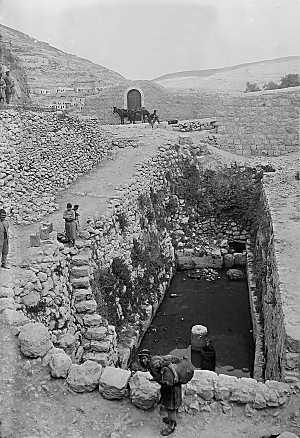
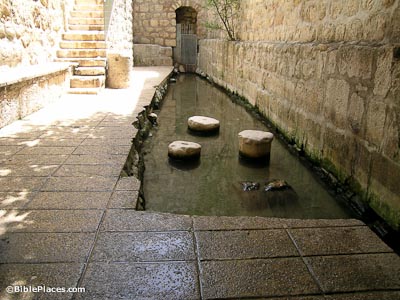
The Byzantine Pool
This is the pool that you enter at the end of the trek through Hezekiah’s Tunnel. There are clear remains around this pool of the Byzantine church built by Empress Eudocia. This pool has long been visited as the pool of Jesus’s miracle; however, it dates to the Byzantine era, roughly 300 years after the time of Christ.
Initial Discovery
In the summer of 2004, work along a drainage pipe revealed some large stone steps. Archaeologists Eli Shukron and Ronny Reich quickly uncovered a series of steps leading down into the adjacent garden.
The Steps Revealed
After some months of work, a large section of these steps were revealed, but work was hindered on one side by the drainage channel (visible as the concrete section on the left side of the photo) and on the other by property owned by the Greek Orthodox Church. At the far end, the corner of the steps is visible, but at this point, no other corners had been revealed.
Continuing Excavation of Steps
Excavations continued, and two corners have now been revealed. One side of the pool has been fully excavated thus far. Archaeologists removed a single-lane paved road in order to conduct the excavations, but the Greek Orthodox Church has forbidden any excavation of their property in the garden to the west. Excavations have uncovered three sets of five stairs each leading down into the pool along its entire 160-foot (50-m) length. This photo looks to the southeastern corner.
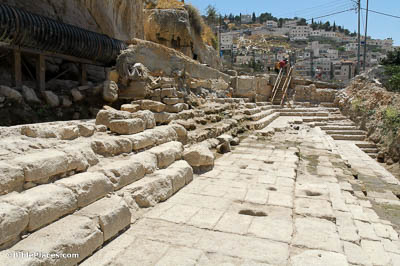
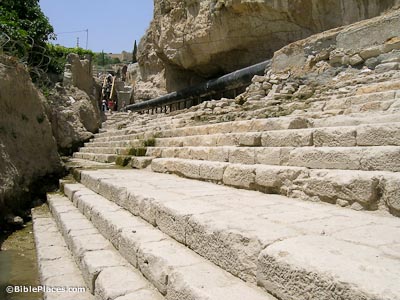
The Pool in the Time of Jesus
Pottery indicates that this pool was in use in the first century. The blind man washed the mud off of his eyes in this pool and received his sight (see John 9). Note the northeastern corner of the steps is exposed at the far end of the photo, where the people are standing.
Where Does It Go?
This view is from across the valley (looking east) and shows the steps that have been excavated (as above). It also gives a perspective of how the rest of the pool is buried underneath the garden. The Greek Orthodox Church has continued to forbid excavations on their property, depriving Christians worldwide of the opportunity to see the full pool made famous by Jesus’s miracle.
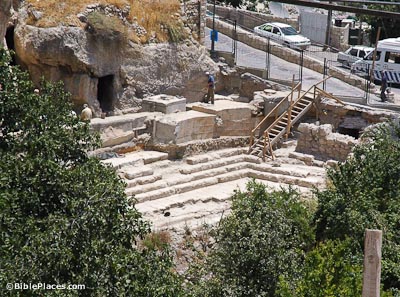
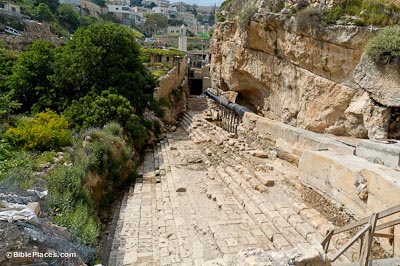
The Size of the Pool
The discovery of the northeastern and southeastern corners indicates not only the length of the pool on one side but reveals the presence of steps on the pool’s northern and southern sides. The angles of the corners are slightly larger than 90 degrees, suggesting that the pool was a trapezoid in shape. Each set of steps was separated by a landing which may have served people entering the pool. The length of the pool is estimated to be as much as 225 feet (70 m), and Jerome Murphy-O’Connor puts the size at 190 x 160 feet (60 x 50 m).
The Two Pools of Siloam
This drawing, created by Father Vincent in the early 1900s, shows the relationship of the two pools (west is at the top). The pool marked with a yellow arrow is the modern pool at the end of Hezekiah’s Tunnel. It is narrow and shallow. The new excavations are in the area labeled as “Birket el-Hamra,” marked with the red arrow. Scholars had long believed that this was the area of an ancient pool, but until these excavations, they did not understand its date, size, or other important details. Excavations allow us to identify this pool as the one of the Bible.
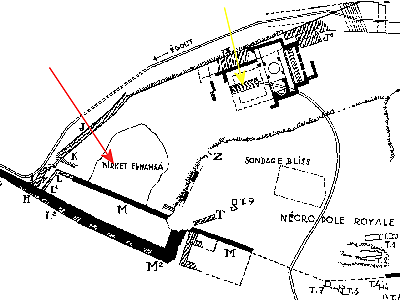
TruLight Ministry News

TruLight Ministries orders from God since 2012 . Teach Them , Comfort Them and Warn Them!
////////////
TruLight Ministries opdrag vanaf God sedert 2012. Leer hulle, Troos hulle en Waarsku hulle!
Pastoor Dirk se Audio Lering Nr 6 van 6 oor die Doping van die Heilige Gees
TruLight School of Theology have started with Its daily Bible Study – Pastor Counselling Certificate – we are Starting with 36 Studies with 10 Studies per Topic from 1st of April 2025 – Over the Next 2 Years we will Include One Daily Study per Topic on this Platform. The Daily Manna Bible Study will be Available in English and Afrikaans!
We will Start with a 68 week Study on “Know Your Bible” Daily Bible Summaries of every Chapter in the Bible! From the Old Testament to the New Testament , from Genesis to Revelation 66 Books of the Bible.
Started 1st April 2025
This is our Study Principals:
SOAP
Scripture: Read a short passage out loud.
Observation: What do you notice about the verses?.
Application: How can you apply this to your life?.
Prayer: Pray about what you’ve learned.
REAP
Read: Read the passage carefully.
Engage: Ask questions about the passage.
Apply: Think about how the passage applies to your life.
Pray: Pray about what you’ve learned.
Introduction to the Bible – Bible Summary
Summary of the Book of Jonah
Author: Jonah 1:1 identifies the book as telling the story of the prophet Jonah.
Although the book is written in the third person, the traditional view is that Jonah is the
author of the book, and there is no persuasive reason to theorize about an unknown
author.
Date of Writing: The Book of Jonah was likely written between 793 and 758 B.C.
Purpose of Writing: Disobedience and revival are the key themes in this book. Jonah’s
experience in the belly of the whale provides him with a unique opportunity to seek a
unique deliverance, as he repents during this equally unique retreat. His initial
disobedience leads not only to his personal revival, but to that of the Ninevites as well.
Many classify the revival which Jonah brings to Nineveh as one of the greatest
evangelistic efforts of all time.
Key Verses:
Jonah 1:3, “But Jonah ran away from the LORD and headed for Tarshish…”
Jonah 1:17, “But the LORD provided a great fish to swallow Jonah, and Jonah was inside
the fish three days and three nights.”
Jonah 2:2, “In my distress I called to the LORD, and He answered me. From the depths of
the grave I called for help, and you listened to my cry.”
Jonah 3:10, “When God saw what they did and how they turned from their evil ways, He
had compassion and did not bring upon them the destruction he had threatened.”
Brief Summary: Jonah’s fear and pride cause him to run from God. He does not wish to
go to Nineveh to preach repentance to the people, as God has commanded, because he
feels they are his enemies, and he is convinced that God will not carry out his threat to
destroy the city. Instead he boards a ship for Tarshish, which is in the opposite direction.
Soon a raging storm causes the crew to cast lots and determine that Jonah is the
problem. They throw him overboard, and he is swallowed by a great fish. In its belly for
3 days and 3 nights, Jonah repents of his sin to God, and the fish vomits him up on dry
land (we wonder what took him so long to repent). Jonah then makes the 500-mile trip
to Nineveh and leads the city in a great revival. But the prophet is displeased (actually
pouts) instead of being thankful when Nineveh repents. Jonah learns his lesson,
however, when God uses a wind, a gourd, and a worm to teach him that He is merciful.
Foreshadowings: That Jonah is a type of Christ is clear from Jesus’ own words.
In Matthew 12:40-41, Jesus declares that He will be in the grave the same amount of
time Jonah was in the whale’s belly. He goes on to say that while the Ninevites repented
in the face of Jonah’s preaching, the Pharisees and teachers of the Law who rejected
Jesus were rejecting One who is far greater than Jonah. Just as Jonah brought the truth
of God regarding repentance and salvation to the Ninevites, so too does Jesus bring the
same message (Jonah 2:9; John 14:6) of salvation of and through God alone (Romans
11:36).
Practical Application: We cannot hide from God. What He wishes to accomplish
through us will come to pass, despite all our objections and foot-dragging. Ephesians
2:10 reminds us that He has plans for us and will see to it that we conform to those
plans. How much easier it would be if we, unlike Jonah, would submit to Him without
delay!
God’s love manifests itself in His accessibility to all, regardless of our reputation,
nationality or race. The free offer of the Gospel is for all people in all times. Our task as
Christians is to be the means by which God tells the world of the offer and to rejoice in
the salvation of others. This is an experience God wants us to share with Him, not being
jealous or resentful of those who come to Christ in “last-minute conversions” or who
come through circumstances dissimilar to our own.
Inleiding tot die Bybel – Bybel Samevatting
Opsomming van die boek Jona
Skrywer: Jona 1:1 identifiseer die boek as die verhaal van die profeet Jona. Alhoewel die
boek in die derde persoon geskryf is, is die tradisionele siening dat Jona die skrywer van
die boek is, en daar is geen oortuigende rede om oor ‘n onbekende skrywer te
teoretiseer nie.
Datum van Skrywe: Die Boek van Jona is waarskynlik tussen 793 en 758 vC geskryf.
Doel van Skrywe: Ongehoorsaamheid en herlewing is die sleuteltemas in hierdie boek.
Jona se ervaring in die maag van die walvis bied hom ‘n unieke geleentheid om ‘n
unieke verlossing te soek, aangesien hy berou het tydens hierdie ewe unieke
toevlugsoord. Sy aanvanklike ongehoorsaamheid lei nie net tot sy persoonlike herlewing
nie, maar ook tot dié van die Nineviete. Baie klassifiseer die herlewing wat Jona na
Nineve bring as een van die grootste evangelisasiepogings van alle tye.
Sleutelverse:
Jona 1:3 , “Maar Jona het van die HERE weggehardloop en na Tarsis gegaan…”
Jona 1:17 , “Maar die HERE het ‘n groot vis voorsien om Jona in te sluk, en Jona was drie
dae in die vis en drie nagte.”
Jona 2:2 , “In my benoudheid het ek die HERE aangeroep, en Hy het my geantwoord. Uit
die dieptes van die doderyk het ek om hulp geroep, en julle het na my hulpgeroep
geluister.”
Jona 3:10 , “Toe God sien wat hulle doen en hoe hulle van hul verkeerde weë afgewyk
het, het Hy medelye gehad en nie die vernietiging wat Hy gedreig het oor hulle gebring
nie.”
Kort opsomming: Jona se vrees en trots veroorsaak dat hy van God weghardloop. Hy
wil nie na Nineve gaan om bekering aan die mense te verkondig, soos God beveel het
nie, want hy voel hulle is sy vyande, en hy is oortuig daarvan dat God nie sy dreigement
om die stad te vernietig sal uitvoer nie. In plaas daarvan klim hy op ‘n skip na Tarsis, wat
in die teenoorgestelde rigting is. Gou laat ‘n woedende storm die bemanning laat loot
en vasstel dat Jona die probleem is. Hulle gooi hom oorboord, en hy word deur ‘n groot
vis ingesluk. In sy maag vir 3 dae en 3 nagte, het Jona berou oor sy sonde teenoor God,
en die vis braak hom op op droëland (ons wonder wat het hom so lank geneem om te
bekeer). Jona maak dan die reis van 500 myl na Nineve en lei die stad in ‘n groot
herlewing. Maar die profeet is ontevrede (eintlik pruil) in plaas daarvan om dankbaar te
wees wanneer Nineve tot bekering kom. Jona leer egter sy les wanneer God ‘n wind, ‘n
kalbas en ‘n wurm gebruik om hom te leer dat Hy genadig is.
Voorafskaduwings: Dat Jona ‘n tipe van Christus is, blyk duidelik uit Jesus se eie
woorde. In Matteus 12:40-41 verklaar Jesus dat Hy dieselfde tyd in die graf sal wees wat
Jona in die walvis se maag was. Hy sê verder dat terwyl die Nineviete berou gehad het in
die aangesig van Jona se prediking, het die Fariseërs en leraars van die Wet wat Jesus
verwerp het, een verwerp wat veel groter as Jona is. Net soos Jona die waarheid van
God aangaande bekering en redding aan die Nineviete gebring het, so bring Jesus
dieselfde boodskap ( Jona 2:9 ; Joh 14:6 ) van redding van en deur God alleen ( Romeine
11:36 ).
Praktiese Toepassing: Ons kan nie vir God wegkruip nie. Wat Hy deur ons wil bereik,
sal gebeur, ten spyte van al ons besware en voetsleep. Efesiërs 2:10 herinner ons
daaraan dat Hy planne vir ons het en sal toesien dat ons by daardie planne pas. Hoeveel
makliker sou dit tog wees as ons, anders as Jona, ons sonder versuim aan Hom sou
onderwerp!
God se liefde manifesteer in Sy toeganklikheid vir almal, ongeag ons reputasie,
nasionaliteit of ras. Die gratis aanbod van die Evangelie is vir alle mense in alle tye. Ons
taak as Christene is om die middel te wees waardeur God die wêreld van die aanbod
vertel en om bly te wees in die redding van ander. Dit is ‘n ervaring wat God wil hê dat
ons met Hom moet deel, nie jaloers of gegrief is oor diegene wat na Christus toe kom in
“last-minute bekerings” of wat deur omstandighede kom wat verskil van ons eie nie.
We are Currently reading and Listening to the Bible, a Chapter by Day !
The total number of chapters in the Bible is 1,189. There are 929 chapters within 39 books of the Old Testament and 260 chapters within the 27 books of the New Testament.
Genesis 26 English – Follow the Reading in Your Bible.
Genesis 26 Afrikaans – Volg die Leser in u Bybel.
Share this Feeding of Manna with your Friends and Family. just click on the Social Media icon and share !